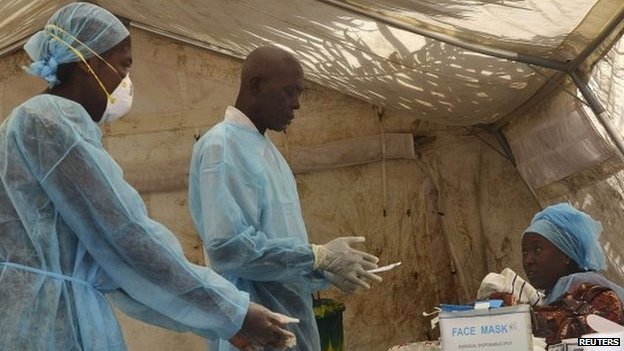Ivory Coast has blocked 400 refugees who fled to Liberia from returning home because of fears they could spread the Ebola virus, a UN official has said.
The decision violated domestic and international law, the official added.
Ivory Coast said it could not allow the refugees in because of the Ebola “pandemic” in Liberia, Guinea and Sierra Leone.
The virus has now killed 603 people in the three states, with 68 deaths reported in the last week, WHO said.
This is the worst outbreak the world has ever seen.
There is no cure for Ebola, which spreads through contact with an infected person’s bodily fluids and there is no vaccine or cure.
It kills up to 90% of those infected but if patients receive early treatment, they have a better chance of survival.
The latest outbreak was first reported in Guinea in February, before spreading to Liberia and Sierra Leone.
‘Greatest pandemic’
UN refugee agency official Mohamed Toure said Ivory Coast had acted “unacceptably” by turning away a convoy of refugees at the border with Liberia.
The agency had offered to carry out medical screening of the refugees, but Ivorian officials still refused, he said.
The group had fled to Liberia during the 2010-2011 conflict that hit Ivory Coast after then-President Laurent Gbagbo refused to accept defeat in elections.
Ivorian government spokesman Bruno Kone defended the decision to block the refugees from entering.
“Everyone needs to show some understanding,” he is quoted by AFP news agency as saying.
“We face the greatest pandemic our region has seen for a long time. We cannot be lax in this area,” he said.
The World Health Organization (WHO) said 85 new cases had been recorded in Guinea, Sierra Leone and Liberia between 8 July and 12 July.
Sierra Leone recorded the highest number of deaths – 52. Liberia reported 13 deaths and Guinea three, WHO said.
The figures include confirmed, probable and suspected cases of Ebola, it added.
WHO spokesman Dan Epstein said it would probably take several months to “get a grip” on the epidemic.
“People are isolated, they’re afraid, they’re scared,” he said.
Source: BBC


